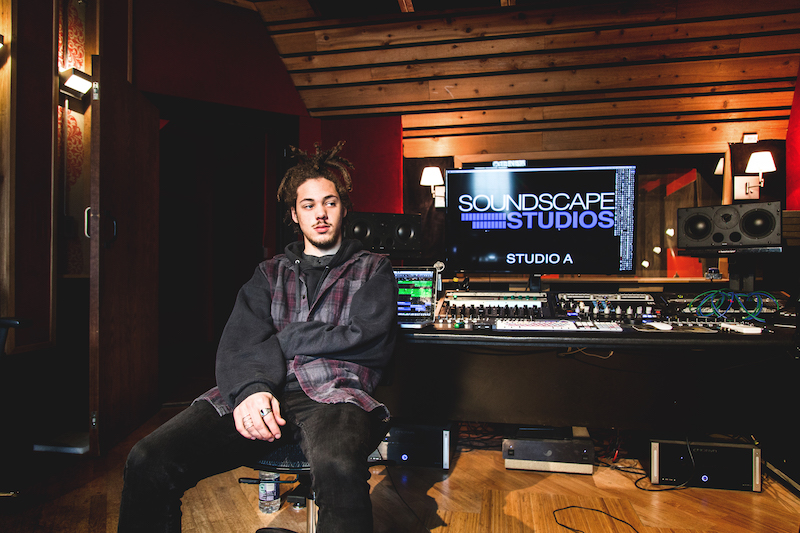(Originally Appeared for TheseDays News)
At a time when most of his peers are hunting down summer jobs, jonesing for internships or cramming for finals, 19-year-old Evanston native Kweku Collins is lounging idly on a couch. An electronic vaporizer in one hand, the other rubbing his loose collection of curious locks, each with it’s own plan and direction that dictate his wily look, Collins looks very much the part of a college student nearing the end of his freshman year and in a way, he is.
Instead of picking a school and signing up for classes though, the ever-sleepy-eyed Collins sent a mixtape to Alex Fruchter and Mike Kolar, owners of the local imprint Closed Sessions. He hit send on the email at the beginning of February 2015, by the time the Chicago River was dyed green, he was a signed artist with a team to boot.
“I signed with Closed Sessions in March,” said Collins, reminiscing on the other end of the story from where he currently sits. “I always knew I wanted music to be my career, even when maybe I wasn’t ready yet artistically, I was just always thinking that I would be ready mentally for whenever that moment came.”
The moment together began with a statement, dropping a lead single with a thinly-veiled message in “To Start A Fire”. While the potential was obvious, there were some understandable sideways glances. Many wondered where this kid from just north of the city got off with his reggae-inspired vocal inflections and all-encompassing lyrical messages. Somewhat surprisingly, it’s something that Collins has been able to recognize and use to his advantage. In the just over 365 days since that signing he’s arguably grown and evolved as fast and efficiently as any of his peers locally or otherwise.
That growth manifested itself in the release of his debut project, Nat Love, releasing April 8. The collection should prove to be both a counter to his previous release, Say It Here While It’s Safe, and a marked step forward for an act that has truly grown up right before our eyes.
In a lot of ways, Kweku is like most 19-year-olds. As we talk, sitting on an oversized couch on the third floor of Soundscape Studios his eyes wander from the conversation here and there. Laying back on the deep cushions, kicking his feet up on the coffee table he plays with his phone, opening it and poking around before dropping it back onto his lap. While on the surface he may resemble another grungy skate kid, getting to know him for any length of time will immediately wipe out the perception.

Collins’ spends most of his time in and around the building in the city’s Ukrainian Village neighborhood that houses both Soundscape Studios and the headquarters for Closed Sessions. Today we’re perched on the top floor in label co-owner Mike Kolar’s humble abode. To be sure, the CS headquarters and the team that makes up the core of the label have become like a pseudo family for the young act, each taking on different roles; the village that’s raising the art. Fruchter and Kolar operate as Mom and Dad, offering advice and guiding him as best they can while producers and fellow CS-signees oddCouple and BoatHouse are like older brothers, always there for help and regulars in the studio in helping to bring Collins’ ideas to life. The piece of mind that the team around him has provided has been an integral part of the realization of potential the young man has encountered since signing.
“I’m extremely pleased with our current roster and Kweku’s addition to it and the way that everyone leans on each other and pushes each other to do better as well as supports each other,” said Fruchter. “This is the type of label I’ve always envisioned. Kweku coming definitely impacts Closed Sessions not just from a talent perspective but from a community perspective. We’re not just working together, we’re real friends, this isn’t some clique-y music thing. Everyone understands each others hope and goals.”
Flanked by an automated gypsy fortune teller-machine, a pair of gold table-lighters and an antique blowhorn of Kolar’s, Collins’ appears right at home as he crumbles herb into the back end of the PAX he’s been pulling on for the majority of our time together. It’s clear the place is a sort of second home and it became literally so recently when he moved into the studio for a week to finish Nat Love.

“I’m able to do what I want with the music, no one’s telling me what to do with my music here and I firmly believe in that, that’s why I love Mike and Alex,” said Collins. For real though, this is everything I ever wanted, it’s the first time I can remember that I don’t have to go to school, it’s crazy. But it’s also liberating, I’m able to feel comfortable here and that makes the music even easier to make.”
The subject matter of the songs on Nat Love is deep without drowning, heavy without being overweight. Kweku knows he sees the world from a unique standpoint; that’s clear. What’s not unique is a 19-year-old rapper who thinks he knows it all. Thing is, as much as Kweku runs full speed towards his convictions and ideas, he also possesses the understanding that there’s more to learn. He’s at once cognizant of his shortcomings and comfortable in his ability to explore an idea, an issue, a thought with a sort of openness that at once creates an interpersonal bridge to listeners and excitement for further growth. Rather than coming off as preachy with his music, Kweku aims for a lower, more relatable plane to operate from, one which lends itself to creating a real connection between the two.
“I think for me it all comes back to the idea of empathy. A lot of my idols growing up were people that provided these global solutions, you know? The Marleys, the Lennons, the Gandhis, the Malcolm Xs, the Kings; shit like that. But my approach is more interpersonal, it’s the idea that if you can have empathy for a person no matter where they come from then you can have respect for a person and where they come from,” said Collins. “You don’t have to like them, you don’t have to be cool with who they are but if you can but as long as you have empathy for who they are as people then we can operate on a level of respect.”

It’s that idea of empathy, of placing one’s self in another’s shoes, that truly drives the project forward. It’s also an important facet of the body of work he has gone about assembling to this point. The product of a black father and a white mother, the youngest of ten kids raised on the musical implication of his father, Kweku sees his work as more than just music. He talks about not fitting in on either side of the hyper-segregated Evanston area, white kids thinking he was black and black kids thinking he was white and everyone applying off-base assumptions in either direction. It’s because of that though, that he is able to find that rare diagonal within the context of what he deals with, and it’s an increasingly important, decidedly conscious look at a country and a world on fire from a young voice still making sense of it all. This year will mark the first election Collins can vote in. Should he continue creating art that connects people to one another and helps bridge the divide of understanding, it could prove to be a powerful tool against the wall-building bigots of the world and the prevailing nonsense of contemporary pop-based rap music.
Having talked about the project with Kweku several times over the course of the last few months he often comes back to a practiced refrain when asked about the differences between this release and his previous drops, Spicy Caliente & Say It Here. The explanation eschews typical detailing of lyrical development or strategic thematics and instead focuses on more abstract ideas.Say It Here was a sort of excited look to the future, as he explains it: “two people walking side by side and looking forward” whereas here the abstract metaphor is the same two people “walking straight ahead, staring directly into one another’s eyes.” There’s something to be had from this particular analogy. Staring into someone else’s eyes while walking has certain basic circumstances. You can’t directly see where you’re going, with only a counterpart’s gaze to move forward. It’s the kind of thing Kweku would come up with and embodies the way he thinks about things on both a macro and micro scale.

That idea of empathy, inserting his own weaknesses, troubled experiences and hope for the future into his music has found a dedicated fanbase as well. Talking about the effect his music has on others, Kweku explains a recent DM he received on Instagram, the millennial mailbox. He tells a story of a couple who had been going through a rough break up, a couple that found reprieve and a future together by listening to his song “Lonely Lullabies”. He touches on listeners who have reached out on various other social media to explain how his words helped them step off the edge, avoid taking their own life or make a necessary change. It’s a sort of power that goes beyond the here today gone tomorrow embellishments of his hip-hop contemporaries, but one that also comes with certain responsibilities and an ability to think beyond his own experiences, all at the tender age of 19.
Taking all of this into consideration, it begs the question: why? Why take the time to create something fully understood? Why not cash in on some bubblegum singles? Why try to be the change you want to see in the world?
When proposed with the question himself, Collins takes a long pause. Leaning back into the couch cushions and pulling casually on the PAX, he looks to the ceiling as if searching for an answer. Suddenly, he finds it.
Sitting up slightly, he offers up the answer with a sort of slight, self-actualized grin.
“Because…why not?”

